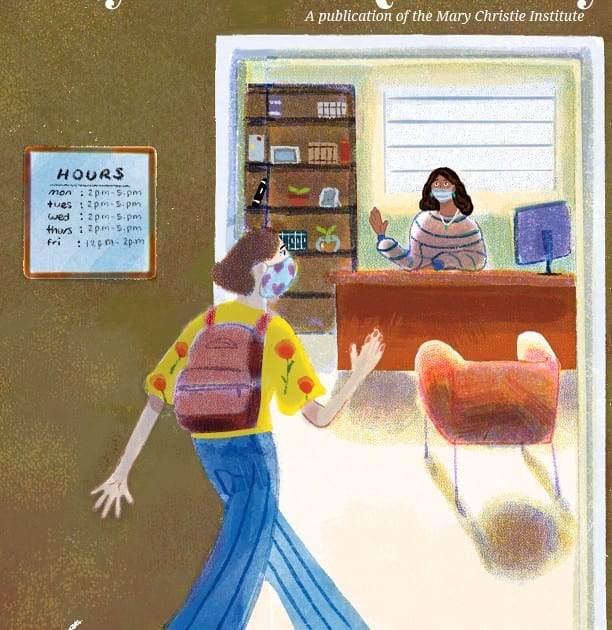Dr. Colleen Conley is as “can do” as they come. Not only does the Associate Professor of Clinical Psychology at Loyola University Chicago fuse practical interventions into her academic research on young adult mental health, she multi-tasks like a magician, producing outcomes in both work and life. “The more you do, the more you get invited to do and the more opportunities come your way,” she says, as she explains her full plate of projects.
Conley and I managed to squeeze in a late-in-the day interview, after a day of meetings and just before her second shift as a mom of three. We spoke via Zoom, as her youngest daughter laid in bed downstairs feeling sick. She called her mother’s phone once during our chat with an update on how she was doing. Minutes later, another daughter passed her a note asking about a snack. “Sure,” she smiled, jumping right back into our conversation about her many projects.
In 2007, Conley joined the faculty at Loyola University of Chicago and started the IMPACT (Improving Mental-health and Promoting Adjustment through Critical Transitions) lab, which is dedicated to moving the needle on adolescent and young adult mental health with new research and intervention programs. It reflects its founder’s pragmatism by combining observational research on the developmental processes of young people with interventions to improve their mental wellbeing. “I really believe in not just doing the research for other academics and publishing in academic journals, but really having a tangible impact for students,” she said.
“If we’re just waiting for students to have problems that are so big that they’re not functioning and relying on students to show up to their campus mental health center or get therapy on their own, then we’re missing a huge proportion of students in need.”
Transitions have long been the focus of Conley’s curiosity. Her interest in developmental transition periods led her to first examining the transition into middle school and puberty in graduate school. “I always take a developmental perspective in trying to understand different populations, sometimes children, sometimes adolescents, and most recently young adults, emerging adults – specifically college students,” she said. Not coincidentally, as she experienced her own transition to parenthood 13 years ago, she also developed an academic interest in the topic, which so far has remained a smaller focus of her work.
Conley says she is particularly interested in the college student population because of the unique challenges of the emerging adulthood developmental period, and what she believes are misperceptions about college students’ privilege and ease in life. “There are a lot of students who are really struggling with their wellbeing for a variety of reasons and that isn’t always recognized.”
She sees an increased need for public health interventions aimed at mental health prevention for the college student population, rather than a medical model approach which kicks in only after students are really struggling.
“If we’re just waiting for students to have problems that are so big that they’re not functioning and relying on students to show up to their campus mental health center or get therapy on their own, then we’re missing a huge proportion of students in need.”
Early on in her work at Loyola, the lab started compiling a large, multi-cohort, multi-wave data set on the adjustment to college. The study included a pre-college baseline, a mid-point at the end of the first semester, and an end-point at the end of the first year. The study showed that student wellbeing declined significantly in the first year. A follow-up study assessing students for three more years showed that wellbeing didn’t start to turn around for many students until after the second year, and for many, not even then.
That knowledge led Conley and her team to conduct a trio of meta-analyses on college student wellbeing programs, which showed that skill-building programs where students receive feedback and coaching are particularly helpful. “Instead of just teaching students about stress and the signs of stress, there’s actually skill practice and assignments. There’s some sort of feedback or communication, it’s more interactive,” she says. “Those are the types of programs that have stronger effects. Since those meta-analyses we published, we’ve pivoted over the last six years or so into developing and testing interventions of our own.”
Those interventions include Honest, Open, Proud (HOP), a peer-led intervention program to reduce self-stigma among college students who identify as living with mental illness; Wellness Advising with Motivational Interviewing (WAMI), a university staff-led project that, in small group and individual advising sessions, teaches college students to recognize and address their mental health needs; Students Taking on Effective Post-Graduate Skills (STEPS), a classroom-based intervention for upper-level students that infuses social-emotional skill-building into a career and life-planning class; and Supportive Accountability Methods for Mentoring Young Adults (SAMMY-A) a hybrid project combining aspects of the wellness advising project with evidence-based mental health apps.
It should be said that Dr. Conley does not take on these projects alone. She has “an incredible research team” of 10 undergraduate and post-bac research assistants and five graduate students pursuing Ph.D.s in clinical psychology, who also stay busy juggling their lab’s many projects along with their courses and clinical work. In addition, collaborating with other researchers and practitioners, both at Loyola and other institutions, is a strong suit. “It’s so hard if you’re just in your academic bubble or in your ivory tower creating these interventions, disengaged from the people who are on the front lines working with students day in and day out,” she says. “And it’s not going to be that effective; you need buy-in from universities. I’m really fortunate that we have all these partnerships with staff, administrators, and with other campuses and academics. It helps our work be more relevant, meaningful, and impactful for students, and more enjoyable for our team.”
The lab’s collaborations extend to commercial partners like Headspace, a popular mindfulness and meditation app. Through their Supportive Mindful Learning (SMiLe) project, the IMPACT lab is currently examining whether using the app is associated with positive mental health outcomes. The project, a randomized control trial, is also testing how the app works with various enhancements, including an orientation program and a “peer supportive accountability model,” to drive engagement. One treatment group gets a two-hour orientation discussing the benefits of mindfulness and introducing the app, and researchers hope to determine whether it improves adherence and use or gives students a better experience of the app. In another treatment group, students are also put into small groups of six, who are connected via Facebook and (at the request of the student participants) in-person, where they encourage each other and provide peer support. Preliminary analysis has found strong, consistent benefits of Headspace use, and these enhancements, on various mental health outcomes.
Creating these interventions is what Conley loves best about her job. “It’s how I get to be creative. I’m not an artist type. I’m more of an intellectual type,” she says. “But I feel like when I create these interventions, I’m combining my academic knowledge with my personal skills, trying to help people. And it can translate into practical outcomes and impacts.”
After the pandemic hit college campuses, the lab also collected observational data on wellbeing measures related to COVID, and has new findings under consideration for a grad-student-led publication that show that while clearly students experienced challenges during the pandemic, they also showed resilience and found silver linings. Some developed new hobbies, focused on their physical health, or took time to reflect on themselves or experience the comforts of home. This research also connects to the lab’s social justice mission, by uncovering ways that “gender and sexual minorities, and low- to middle-income students, noted some effects of the pandemic more often than their peers.”
The lab is already looking for its next project. With colleagues from Johns Hopkins and Tel Aviv University, Dr. Conley is interested in exploring the development of a college-student-specific intervention based around interpersonal psychotherapy (IPT), a form of psychotherapy that takes more of a relational framework than cognitive behavioral therapy (CBT). In IPT, the patient tries to understand their mood in the context of an interpersonal relationship or a role transition. Large RCTs and meta-analyses have shown that IPT is equally as effective as CBT in treating depression. Dr. Conley thinks it would apply well to the college student population whose issues are often co-mingled with their relationships and role transitions.
“Like so much in life, the problems college students face tend to have an interpersonal focus,” she says, revealing more of her real-world wisdom.




